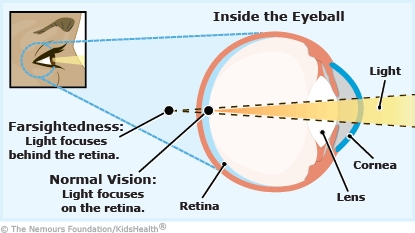- Parents Home
- Para Padres
- A to Z Dictionary
- Allergy Center
- Asthma
- Cancer
- Diabetes
- Diseases & Conditions
- Doctors & Hospitals
- Emotions & Behavior
- First Aid & Safety
- Flu (Influenza)
- Food Allergies
- General Health
- Growth & Development
- Heart Health & Conditions
- Homework Help Center
- Infections
- Newborn Care
- Nutrition & Fitness
- Play & Learn
- Pregnancy Center
- Preventing Premature Birth
- Q&A
- School & Family Life
- Sports Medicine
- Teens Home
- Para Adolescentes
- Asthma
- Be Your Best Self
- Body & Skin Care
- Cancer
- Diabetes
- Diseases & Conditions
- Drugs & Alcohol
- Flu (Influenza)
- Homework Help
- Infections
- Managing Your Weight
- Medical Care 101
- Mental Health
- Nutrition & Fitness
- Q&A
- Safety & First Aid
- School, Jobs, & Friends
- Sexual Health
- Sports Medicine
- Stress & Coping
Farsightedness (Hyperopia)
What Is Farsightedness?
Farsightedness (hyperopia) is a vision problem that makes it hard to see nearby objects clearly.
What Are the Signs & Symptoms of Farsightedness?
Kids with farsightedness may have:
- blurred vision
- eyestrain
- headaches
- tiredness
Some kids also may:
- squint
- rub their eyes a lot
- show a lack of interest in reading
What Causes Farsightedness?
Farsightedness happens when light that enters the eyes doesn’t bend as it should. Instead of focusing directly on the retina, the light focuses behind the retina.
Farsightedness can run in families.

How Is Farsightedness Diagnosed?
An eye doctor can tell you if your child is farsighted. They will do a routine exam that usually includes:
- asking about symptoms
- taking a family medical history
- examining the eyes
- doing vision tests
How Is Farsightedness Treated?
Many kids are farsighted. Some amount of farsightedness can be normal depending on a child’s age. Often, the condition gets better on its own as kids get older. If it doesn’t, the eye doctor will prescribe glasses or contact lenses.
How Can Parents Help?
To help take care of your child’s eyes:
- Get eyeglasses (or contact lenses if recommended). Let your child help choose the frames. Plastic frames and polycarbonate lenses are best for young kids.
- Help with contact lenses. If your child is old enough and the eye doctor thinks contacts are a good choice, help your child follow all instructions on wearing and cleaning them.
- Go to follow-up visits with the eye doctor.
- Call the doctor if your child has new symptoms, such as eye pain, headaches, crossed eyes, or changes in vision.

© 1995- The Nemours Foundation. KidsHealth® is a registered trademark of The Nemours Foundation. All rights reserved.
Images sourced by The Nemours Foundation and Getty Images.
